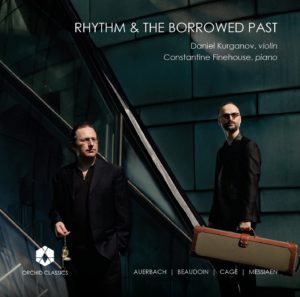Lera Auerbach’s four-movement Third Sonata alternates between slow and fast sections. The slow music evokes late Shostakovich, but with more pronounced register extremes and plenty of gnawing downward violin glissandos. The second movement begins like a driving toccata, while the fourth starts with similarly energetic music pumped up to thicker, more abrasive extremes. At its midway point, however, the music considerably slows down, featuring pounding repeated bass notes in the piano and long sustained violin lines as the music winds down to a quietly desolate conclusion. In Richard Beaudoin’s three-movement In höchster Not (In deepest need) I’m most attracted to its third movement, where passages with bold violin lines supported by steady piano chords break out into rapid atonal flurries.
Both violinist Daniel Kurganov and pianist Constantine Finehouse play the Auerbach and Beaudoin works with extraordinary fervor, commitment, and technical prowess, and it would be hard to beat these exceptionally well-engineered world-premiere recordings. Even the previously recorded John Cage Nocturne benefits from these musicians’ nuanced delicacy and control of the low-level dynamics.
Kurganov and Finehouse admirably hold their own alongside competing recordings of the Messiaen Thème et variations. In the Fourth Variation, the players achieve a balance of power that brings out the music’s suppleness and passion, unlike in many recordings where the piano takes center stage. Some may find the conceptual and theoretical tone of Beaudoin’s booklet notes a bit arcane, yet one cannot dispute the clarity and intelligence of his writing style. In sum, a serious, substantial, and well-engineered program.
































